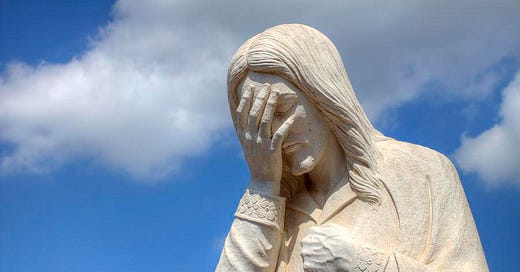Dumb Legal Philosophy Arguments #2
The second part in my series on bad arguments in legal philosophy. Background: the issue is whether judges and juries should make their decisions based on what is just, or instead make decisions based only on what the law says.
Dumb Legal Philosophy Argument #2 (DA2) says:
People should not decide based on justice, because people have all sorts of ideas about justice! White supremacists might think that racially motivated hate crimes are acceptable, and therefore that it is just to acquit hate criminals. Would it therefore be okay for a racist jury to acquit a hate criminal? Of course not! Therefore, people should make decisions based on the law, rather than justice.
What is wrong with this reasoning?
The Basic Confusion
Most basically, the argument confuses “justice” with “whatever anyone happens to think (possibly irrationally) is just”. Hence, it confuses the view that juries and judges should make decisions based upon what is just with the view that juries and judges should make decisions based on whatever they happen to believe (possibly irrationally) is just.
Compare the following objection to upholding the law:
Suppose that Crazy Jack thinks that upholding the law requires murdering 10 innocent people. Would it therefore be okay for Crazy Jack to murder 10 innocent people? Of course not! Therefore, people should follow justice, not whatever they happen to think the law requires. Therefore, people should make decisions based on justice, rather than the law.
This is parallel to DA2, except that “the law” and “justice” have been switched, and instead of using an example of someone with crazy beliefs about justice, we use an example of someone with crazy beliefs about the law. If you wouldn’t accept the above argument for ignoring the law, you shouldn’t accept the argument for ignoring justice either.
But How Do We Know?
You might object to the rule, “Pursue what is really just (not whatever you happen to believe is just),” since a person cannot tell the difference between what is just and what they believe to be just. A person cannot reasonably be told that, in the event that they have a false belief about justice, they should simply follow the objectively correct view of justice. Therefore, you might think, the only reasonable advice that we could give would be to follow what one takes to be just.
Two points to make about this: First, the question of what advice we should, from a practical standpoint, give to ordinary people, is different from the question of what in fact people ought to do. It may be true that people ought to do X, even if telling them that would not be practically helpful (perhaps because they are unable to identify X, or for whatever other reason).
Second, in any case, when it comes to offering useful advice, of course we can say much more than “pursue what you take to be just.” For one thing, anyone who believes in some sort of right of conscience is also going to say, at a minimum, that individuals have an obligation to think seriously and rationally about what morality/justice requires, before acting on their beliefs – no one thinks that it is morally proper to follow utterly capricious moral beliefs. So one could certainly give advice about how to learn about relevant issues, and how to think critically about them.
For another thing, one can give useful guidance about the substantive principles of justice. For instance, that it is unjust to violate individuals’ rights, and that individuals generally have a right against harmful coercion. One could describe some of the conditions under which that right is outweighed or undercut (self-defense, etc.). It’s not as though no one knows anything about justice, so that nothing useful could be said.
Filling in the Argument
Maybe I’ve misunderstood how the example of the racist jury is supposed to work. I don’t know, but somehow that sort of example is supposed to show that even non-racist juries should never nullify the law – for example, that you shouldn’t vote to acquit a drug criminal on the grounds that the drug laws are unjust. So, question: In this argument –
P1. It would be wrong for the racist jury to acquit the hate criminal based on their belief that hate crimes are permissible.
C. Therefore, it would also be wrong for a jury to acquit a drug user based on the belief that drug prohibition is unjust.
– what premise do we have to add in order to make the argument seem cogent? What background assumption is the advocate of that argument making? It looks to me like you have to assume something like P2, P3, or P4:
P2. Drug prohibition is unjust only if hate crimes are permissible.
P3. The belief that hate crimes are permissible is equally reasonable, or equally likely to be true, as the belief that drug prohibition is unjust.
P4. If the racist jury isn’t justified in their belief, then no one is justified in any moral belief.
But all of those (and all similar assumptions) are absurd. The case against the drug laws is obviously much, much stronger than the “case” for permitting hate crimes (I use scare quotes because there in fact is no such case). So it is very unclear how the wrongness of letting hate criminals go free is supposed to be evidence that it is wrong to let drug users go free.
An Analogy
Immanuel Kant held the extreme view that lying is always wrong. So if the Nazis show up at your door, asking if you know where any Jews are hiding, and if you happen to have some Jews hiding in your attic, it would be impermissible, in his view, to tell the Nazis that you do not know of any such Jews. That would be (*shudder*) a lie.
Almost everyone thinks this position is crazy. That’s because it is crazy. Obviously, lying is sometimes permissible. (Indeed, we tell lies for much less momentous reasons all the time, and many of them are okay.)
Now, if we try to reason about lying, in a way parallel to DA2, we would say something like this:
People have all sorts of crazy ideas about morality. A con artist might think it morally justified to lie in order to defraud people of their money. But surely that isn’t justified. Therefore, we should choose our statements based solely on the truth, not what we think is morally justified. I.e., we should never lie.
That is not correct. The fact that some people would lie for bad reasons does not prove that lying is always wrong.
Similarly, then, the fact that some juries would nullify for bad reasons does not prove that jury nullification is always wrong.




